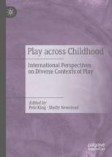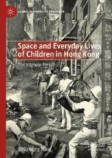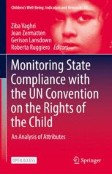Search
Search Results
-
Play Across Australian Schooling
The aim of this chapter is to investigate how Australian children have encountered play during their schooling. This chapter briefly considers how...
-
How Does Science Learning Happen During Scientific Play? A Case Example of the Dissolution Phenomenon
Several early years curriculums worldwide highlight the need for promoting learning and development through play. However, we do not know much about...
-
The Uncertainty of Creativity: Opening Possibilities and Reducing Restrictions Through Mindfulness
This chapter explores the pivotal role that uncertainty plays in creative learning, with a focus on mindfulness as an approach to working with...
-
Geographical Constraints and College Decisions: How Does For-Profit College Play in Student’s Choice?
Geography of opportunity research has identified places with few or no college options: so-called “education deserts.” This study extends this...

-
The Process of Play in a Playwork Context
Playwork is a recognised profession in the UK and the practice of playwork is currently growing internationally. Within playwork, play is currently...
-
The Emergent Dimension of Play
Drawing together ideas from the previous three chapters I develop the concept of ‘the emergent dimension of play’ as a means of describing the nature...
-
Mathematics Through Play: Reflection on Teacher Narratives
Play has become an implicit and often long-forgotten ingredient of high school mathematics instruction. This chapter discusses the performative...
-
Screens, Play, Sport, and Homework: Children’s Out-of-School Activities in Melbourne
This chapter draws on research from the Global Childhoods project with children in Melbourne to explore their experiences of activities outside of...
-
Garden City: Urban Form, Colonial Domesticity, and Spaces of Play in Childhood, 1921–1941
In 1923, the five-year-old Catherine Joyce Symons (b. 1918), a Eurasian child (born of mixed parentage), moved with her family to their new home in...
-
Enacted Curriculum of Private English Kindergartens in Korea: Cases of Three Play-Based English Kindergartens in Seoul
In South Korea where English is highly valued for one’s academic and career success, the English immersion programmes offered by private English...
-
Health Promotion and Identity Construction in Norwegian Kindergartens – A Qualitative Study on Children with and without Disabilities
This article focuses on how children, independent of abilities, create healthy identities and spaces in kindergarten, and is based on a qualitative...
-
Article 31: The Rights to Rest, Play, Recreation, and Cultural and Artistic Activities
‘We have to make sure that school establishment organise artistic and cultural competition.’ (Africa)
-
Teach Them to Play! Educational Justice and the Capability for Childhood Play
Many consider play a natural part of childhood, and although there is disagreement in the literature on what essentially defines “play” in childhood,...
-
Peep in the Pandemic: Peep Practitioners Listening to Parents and Families
The Peep Learning Together Program (Peep), developed by the charity Peeple, aims to enhance parents’ skills in promoting their child’s early learning...
-
Free and Guided Play and Unequal Childhoods
This chapter approaches teenage online and offline play through the lenses of social class, gender, ethnicity and disability. The frequency of...
-
Do Financial Conditions Play a Role in University Dropout? New Evidence from Administrative Data
A large strand of research in the economics and sociology of education has highlighted the existence of deeply rooted inequalities in educational...
-
Sociocultural adjustment and social support as predictors for international medical sciences students’ anxiety during COVID-19
BackgroundThe prevalence of anxiety is high among international medical sciences students and it increased even more during the COVID-19 pandemic due...
-
Restricted by Measures Against the Coronavirus? Difficulties at the Transition from School to Work in Times of a Pandemic
The paper begins with the prerequisite assumption that social deprivation is a fragile and porous category. Thus, our hypothesis is, that how people...
-
Teenage Free and Guided Play in the Era of Intensive Parenting
This chapter considers teenage play and peer interactions in the era of intensive parenting. Parents influence their children’s peer interactions but...
-
Navigating structural constraints: women’s agency in engineering studies and teaching in Bangladesh
Evidence demonstrates that women in Bangladesh are underrepresented both in engineering education and relevant career domains. This study explores...
